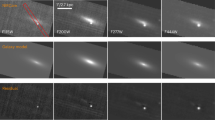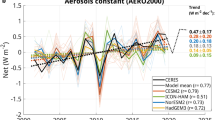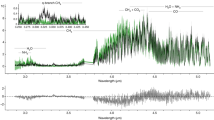Abstract
ABNORMAL ionospheric absorption of cosmic radio noise has been investigated at Moscow (46° 44′ N., 117° 00′ W.), Idaho, U.S.A., since September 1962. Observations are being made by three riometers operating at the frequencies of 20, 30 and 40.25 Mc/s.
This is a preview of subscription content, access via your institution
Access options
Subscribe to this journal
Receive 51 print issues and online access
$199.00 per year
only $3.90 per issue
Buy this article
- Purchase on Springer Link
- Instant access to full article PDF
Prices may be subject to local taxes which are calculated during checkout
Similar content being viewed by others
References
Ziauddin, Syed, Nature, 191, 1084 (1961).
Nicolet, M., J. Atmos. Terr. Phys., 3, 200 (1953).
U.S. Standard Atmosphere, 1962 (U.S. Government Printing Office, Washington, D.C., 1962).
Moler, W. F., J. Geophys. Res., 65, 1459 (1960).
Ziauddin, S., and Forsyth, P. A., J. Geophys. Res., 66, 2315 (1961).
Author information
Authors and Affiliations
Rights and permissions
About this article
Cite this article
KIM, J., KLEINKOPF, J. Heights of Central Absorbing Regions for a Strong Auroral Absorption Event at Lower Latitude. Nature 203, 1160–1161 (1964). https://doi.org/10.1038/2031160b0
Issue Date:
DOI: https://doi.org/10.1038/2031160b0
Comments
By submitting a comment you agree to abide by our Terms and Community Guidelines. If you find something abusive or that does not comply with our terms or guidelines please flag it as inappropriate.



